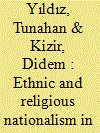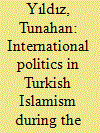|
|
|
Sort Order |
|
|
|
Items / Page
|
|
|
|
|
|
|
| Srl | Item |
| 1 |
ID:
190685


|
|
|
|
|
| Summary/Abstract |
This article compares the ideas of Hüseyin Nihal Atsız and Seyyid Ahmet Arvasi, two iconic ideologues of ethnic and religious nationalism in Turkey, respectively, on the issues of history, identity, and national ideal. It first argues that Atsız mainly presents a history of Turkish supremacism whereas Arvasi embraces a method of Islamization to remember history. It also demonstrates that Atsız tends to equate the racial and the national while Arvasi uses Islamic legitimacy for Turkish identity and nationalism. It is also evident that while Atsız offers classical pan-nationalism, Arvasi shows third-worldist and universalistic tendencies in defining Turkish destiny.
|
|
|
|
|
|
|
|
|
|
|
|
|
|
|
|
| 2 |
ID:
190111


|
|
|
|
|
| Summary/Abstract |
This article will discuss the early discourse of Islamism on international politics in Cold War Turkey. It brings forth four main findings. First, while Islamists bandwagoned onto the discourse of the Turkish state and the Western bloc in presenting the Soviet Union as a national and global threat, they also sought to operationalize their anti-Sovietism for their broader political agenda. Second, Islamists effectively committed to the Western bloc during the period, but this commitment was replaced by anti-Westernism particularly from the mid-1960s onwards. Third, they substantially discussed decolonization with Pakistan, Palestine, and Algeria at the forefront, but their treatment of decolonization oscillated between glorification and devaluation and never paved the way for a Third-Worldist approach. Fourth, while pan-Islamism had an important place in their thinking, it came along with a commitment to the states-system as well as Turkey’s Cold War alliance, a retreat from classical Islamic concepts, and a conception of Turkish exceptionalism. In so doing, this article shows how the course of the Cold War shaped Islamism. It also demonstrates the pragmatism and eclecticism of Islamism. It is equally evident that Islamism was developed in interaction with, not in opposition to, nationalism and the discourse of national interest.This article will discuss the early discourse of Islamism on international politics in Cold War Turkey. It brings forth four main findings. First, while Islamists bandwagoned onto the discourse of the Turkish state and the Western bloc in presenting the Soviet Union as a national and global threat, they also sought to operationalize their anti-Sovietism for their broader political agenda. Second, Islamists effectively committed to the Western bloc during the period, but this commitment was replaced by anti-Westernism particularly from the mid-1960s onwards. Third, they substantially discussed decolonization with Pakistan, Palestine, and Algeria at the forefront, but their treatment of decolonization oscillated between glorification and devaluation and never paved the way for a Third-Worldist approach. Fourth, while pan-Islamism had an important place in their thinking, it came along with a commitment to the states-system as well as Turkey’s Cold War alliance, a retreat from classical Islamic concepts, and a conception of Turkish exceptionalism. In so doing, this article shows how the course of the Cold War shaped Islamism. It also demonstrates the pragmatism and eclecticism of Islamism. It is equally evident that Islamism was developed in interaction with, not in opposition to, nationalism and the discourse of national interest.
|
|
|
|
|
|
|
|
|
|
|
|
|
|
|
|
|
|
|
|
|